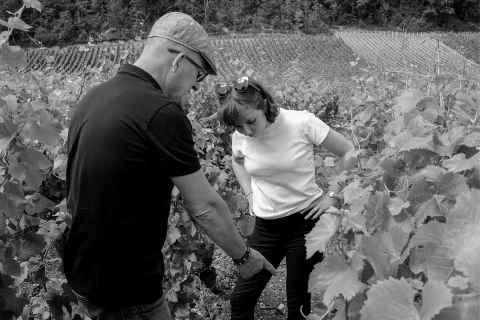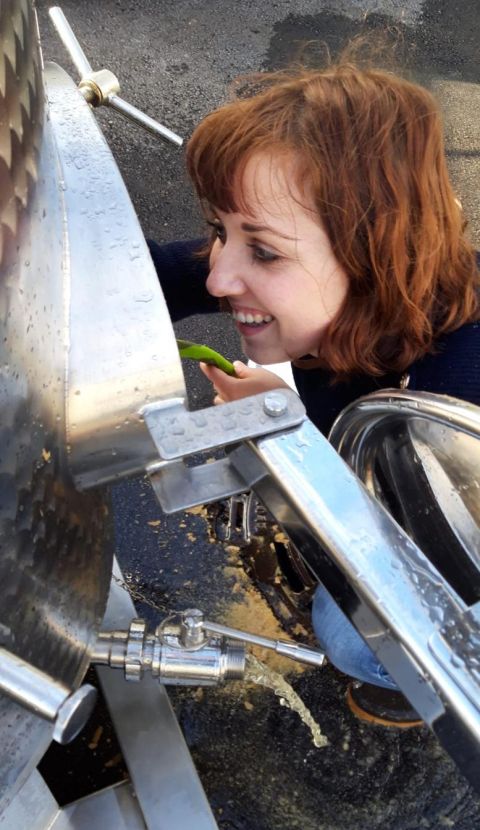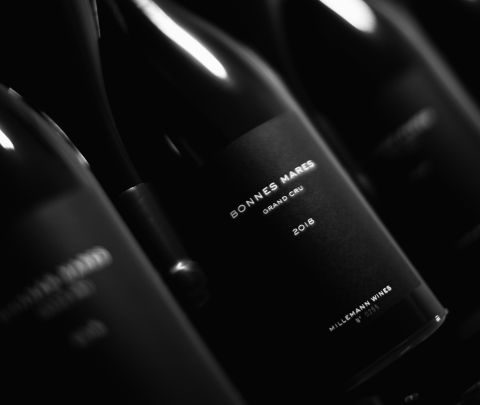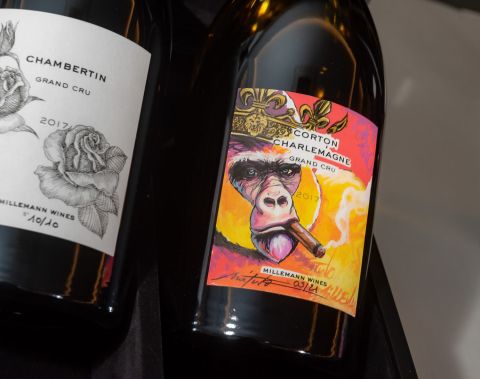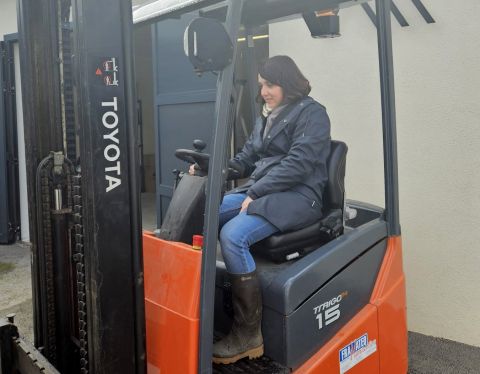Women in Wine – Charlotte Millemann


Victoria Mason MW interviews the head of one of the newest wineries in Burgundy. This is the sixth in our series of interviews, done in conjunction with Bordeaux Index, with the women behind many of the world’s top wineries. See the entire list of interviews in our guide.
Since 2003, Pierre and Stéphanie Millemann have run Millemann Consultants, working with estates such as Domaine Dujac and Gaia as well as other top estates in Germany, Austria, Switzerland and the US. In 2017, their daughter Charlotte joined them, and they immediately put her degree in oenology and viticulture to good use by launching their own wine label. Charlotte is now in charge of Millemann Wines, bottling single barrels of grand cru burgundy crafted from fruit grown by producers for whom they consult.
Victoria You live in Burgundy; were you born there?
I was actually born in the Jura where my parents met. My mother originated from there and my father held a position as a winemaker. We then moved to the south of France where my father held several positions as a winemaker. We moved back to Burgundy when I was about five, with my parents starting the business in 2003. I’ve been in the middle of it all for my whole life!
Was there a key moment when your fascination with wine began?
I’m an only child so was with my parents a lot. I was with them in the car going to appointments with my dad or going with my mum to collect samples from clients. Most of our clients are in Burgundy and I’ve known them since I was five or six. I would be in the cellars all the time. I would spend time in the vineyards and do things with my father on the weekends – I’ve just lived through it.
Do you remember the first time you tasted wine?
I don’t think I remember the first time I tasted wine because it’s tradition on a child’s first birthday to put a touch of wine on their lips. My parents allowed me to taste wine to get an insight into it from a very young age. I think the first time that I was allowed my first full glass of wine was maybe my 12th birthday when I sipped my first half-glass of champagne. I remember it because it was the first time I was a bit tipsy, which was a new feeling to me! I am still a very big fan of champagne.
You studied English and German at the Sorbonne in Paris before going on to a degree in oenology and viticulture. Was the plan always to join the family business?
The decision came later. I had been in this environment my whole life and I think I wanted to see something else. I’ve seen, through my parents’ work in consulting, that working internationally is important. That’s why I decided to study languages, because from a young age I’d seen that it was important to be able to communicate with people all around the world in their own language.
The first plan was to work in the jewellery sector. People tend to think it is very different from the wine industry but in fact, it’s quite similar in the way that you go from a very raw product like grapes and stones and through hard work you make something extraordinary out of it. When I was about to finish my degree and having had several internships, I noticed that the jewellery industry was a big one with big businesses and lots of people. Having grown up in Burgundy with lots of family businesses, it felt way too much and too big for me. I saw the wine-consulting business and what it involved and thought ‘that’s quite cool, drinking for work – maybe that would be nice!’ I could also use my language skills. So I gave it a shot and it worked!
Was there a part of your oenology and viticulture studies that appealed more to you?
The only bit which I must admit was not my cup of tea was all the chemistry. But as I’d heard from my father, looking at viticulture is like the way you’d ask a three-Michelin-star chef to make an amazing dish with bad products – he wouldn’t be able to achieve it. Viticulture is really the basis of all winemaking. What really fascinated me was the extraction process for red wines and all the tiny details that can be adjusted and make a huge difference to the wine.
What was your role when you joined Millemann Consulting in 2017 and how would you define your role now?
It needed some adjustments at the beginning because my parents were doing it all on their own, so I just needed to find my space. The agreement today is that my dad does all the technical parts and works with clients. My mother and I organise the schedules and my mother manages the French-speaking clients which include Burgundy and Switzerland while I handle German- and English-speaking clients. A large part of the work is working closely with the Damy cooperage in Meursault, and we are agents for them in Germany and Switzerland.
What are the biggest positives and negatives of working in a family business?
We gain a lot of time because there’s not always the need to communicate verbally as we can just look at each other and know what the other is thinking. If I’m being very honest there are small disagreements, but we discuss those and see other’s points of view and give them a go. We trust each other. I think what’s great about family businesses is that although more feelings are involved, if you disagree with something you tend to just say it and then it’s done and there’s no resentment. No one takes things personally.
But a downside is that you’re pretty much always working. Sometimes you’ll be relaxing but then you think of something and mention it and before you know it, it’s turned into an hour-long business talk even though it’s a Sunday afternoon. We try to separate things as much as possible because you need to relax in order to be efficient at other times.
How did you decide to begin bottling your own wines?
There were three points which led us to making wine under our own name. We thought it could be nice to start a business in which the three of us could be involved from the very start. This was also an opportunity for me to learn how to make wine practically.
And the third part, maybe the biggest part, is that we wanted to make a charity project. When I was 15 I was diagnosed with Crohn’s disease, which was very hard for me of course. I’d say even harder for my parents as it took a year for the doctors to figure out what I had. It could have been much worse if it had been a cancer but that was a difficult year. One of my mum’s friends lost a baby girl at three months. Knowing that people have to experience this makes it very real. That’s how the charity project idea came about.
The initiative started with the first vintage, 2017, and we started offering magnums in 2019 when the first vintage was being bottled. We sell the 75-cl formats but these magnums and bigger formats like jeroboams are only for charity. Then we started thinking about how we could add value to these bottles and then the idea came about that we should have the bottle labels personalised. Our regular labels are black and for this first edition of the 2017 we printed white labels for people to sign them, draw on them and make them their own. So, each label is an original. They’re not printed. They have been personalised by many people including Prince Albert of Monaco. The Princess Grace Foundation of Monaco gives money to research programmes for ill children. It also builds houses for parents next to hospitals. In the wine world we also had Aubert de Villaine from DRC. Also, Brigitte Bardot, the French actress. We wanted to get many people from different fields of work because illness can affect all of us.
Your first charity auction was last November, raising more than €100,000 for the Princess Grace Foundation. Will you do another?
When the evening ended, we all said no because it was a tremendous amount of work! It was so exciting, and we met a lot of people – it was amazing. We truly couldn’t have imagined raising so much money and having so much fun with all the people who came. I think we’re slightly worried people will lose interest if we do it every year, but we still release special editions each year with different themes.
What are your ambitions for the business?
I’d say, short term, we have the will to expand, which we’ve been doing a little since the 2022 vintage. Our goal is not to expand too much so that we can remain focused on what we’re doing and maintain the same level of quality. We also want to keep going with great ideas for charity so that we can give back as much money as possible. I think what people have realised throughout COVID is that unfortunately none of us is safe from being ill.
What does sustainability mean to you and how to you seek to integrate it into what you do?
The first thing that comes to mind is environmental sustainability. Of course, we work with nature and the seasons, we work with the weather and in the past years we’ve seen how much climate change has affected us. We’ve had some complicated and extreme vintages such as 2003 so that’s not new. But in terms of respecting the vines and soil, it’s very important to work with nature and to respect it. The other aspect is that wine is a very traditional industry in Burgundy and it remains in the hands of small businesses which must adapt to modernity and new techniques. It’s also important to use common sense as a lot of things have been lost throughout the years and it can be good to go back to basics. You need to make a bridge between tradition and modernity.
What are your favourite wine regions for Chardonnay and Pinot Noir outside of Burgundy?
If I’m including both varieties, I would say Champagne. Always important! For Pinot Noir I am a big fan of Baden in Germany. I tend to think you find the elegance found in Burgundy there. And for Chardonnay, it is smaller production but I would say the Jura. I think my mum would kill me if I didn’t mention it! I love to drink other varieties but I am and always will be a big fan of Chardonnay and Pinot Noir of course. For reds I love Syrah from the Rhône Valley. For the whites, Sauvignon of course and Riesling from my time in Germany.
Are there any regions that you’re not already working with that you would really like to work with?
We are eager to work with Germany as I think that people picture Germany as just making very sweet wines and sometimes low quality. But that was 40 years or so ago and now they’re making amazing wines! I’m interested in regions with lots of different characteristics. It’s like in Switzerland where, because of the varying characteristics depending on where you are, for example the mountains and the lakes, the wines can be very different.
What wine is in your fridge right now?
Champagne always! There doesn’t need to be a special time to open a bottle. The one I have right now is from Veuve Fourny & Fils. They are two brothers and in fact my dad studied alongside one of the brothers in his first two years of his studies. We like to buy wine from the people we like.
What do you do when you’re not thinking and drinking wine?
Well, drinking wine is a big part of my life! Otherwise you’ll most likely find me walking my dog through the vineyards as I live very close by.
What advice would you give to your younger self six years ago when you joined the business?
I’d say don’t ever feel stupid for not knowing something. There is so much to know about wine and no one can know everything. You will always learn so much by asking questions.
You can find the full interview at Bordeaux Index. Purple Pagers can read our notes on Millemann wines in our tasting note database.
Become a member to view this article and thousands more!
- 15,416 featured articles
- 275,327 wine reviews
- Maps from The World Atlas of Wine, 8th edition (RRP £50)
- The Oxford Companion to Wine, 5th edition (RRP £50)
- Members’ forum
- 15,416 featured articles
- 275,327 wine reviews
- Maps from The World Atlas of Wine, 8th edition (RRP £50)
- The Oxford Companion to Wine, 5th edition (RRP £50)
- Members’ forum
- 48-hour preview of all scheduled articles
- Commercial use of our wine reviews
